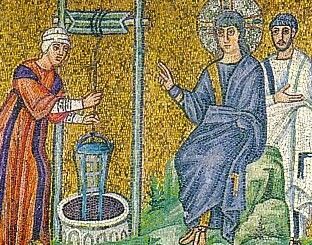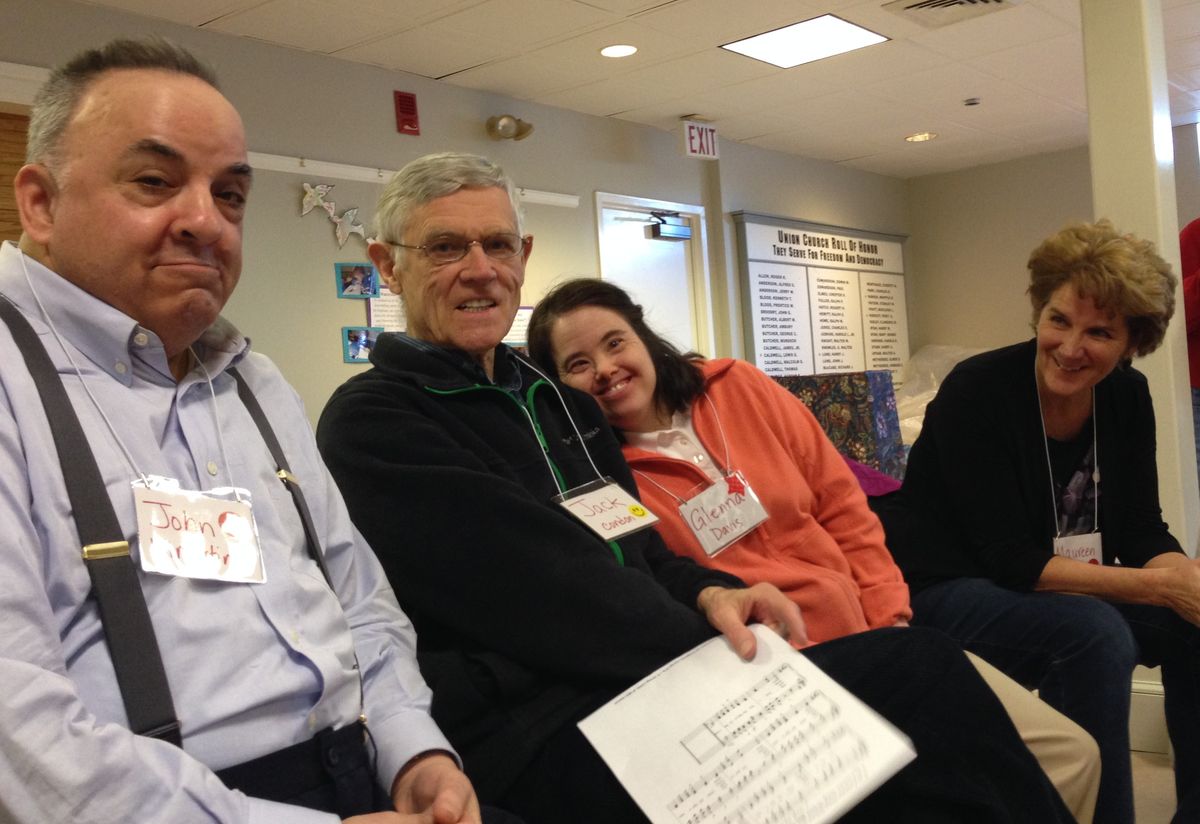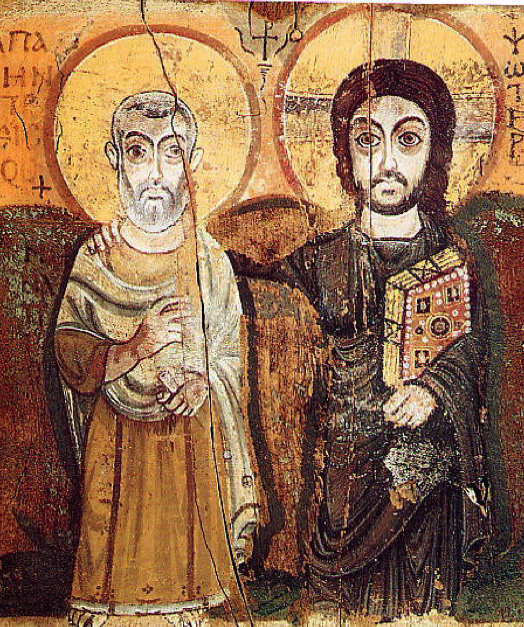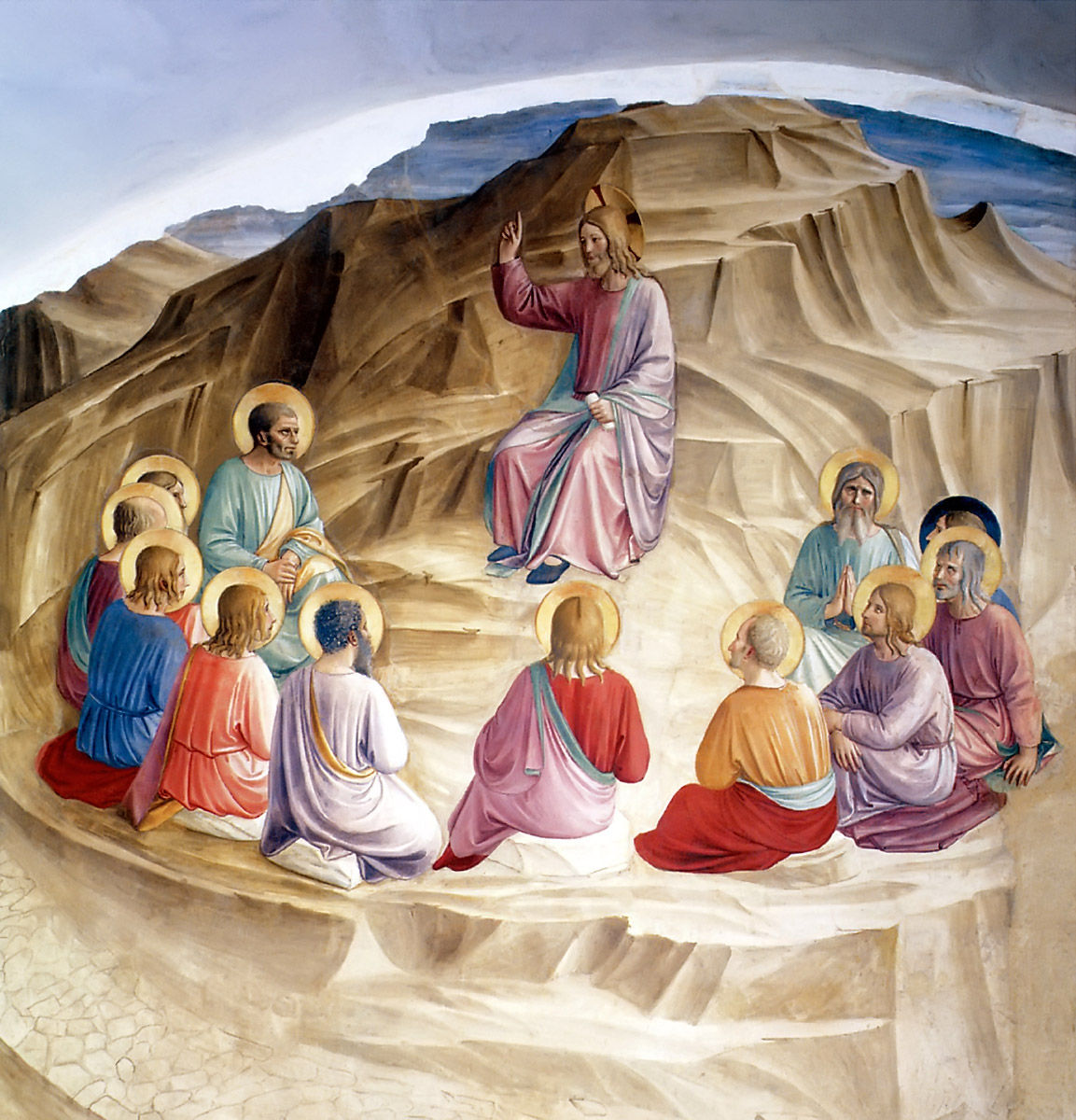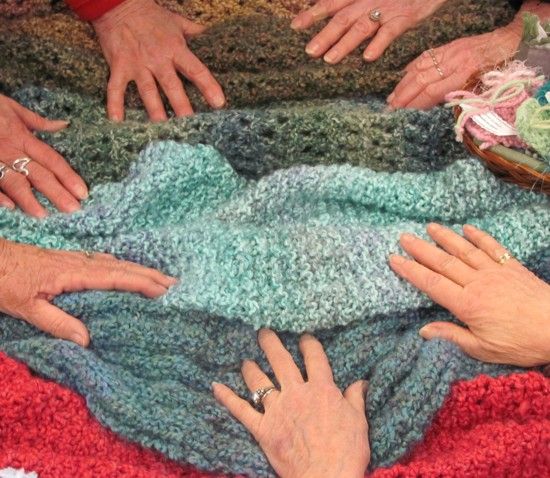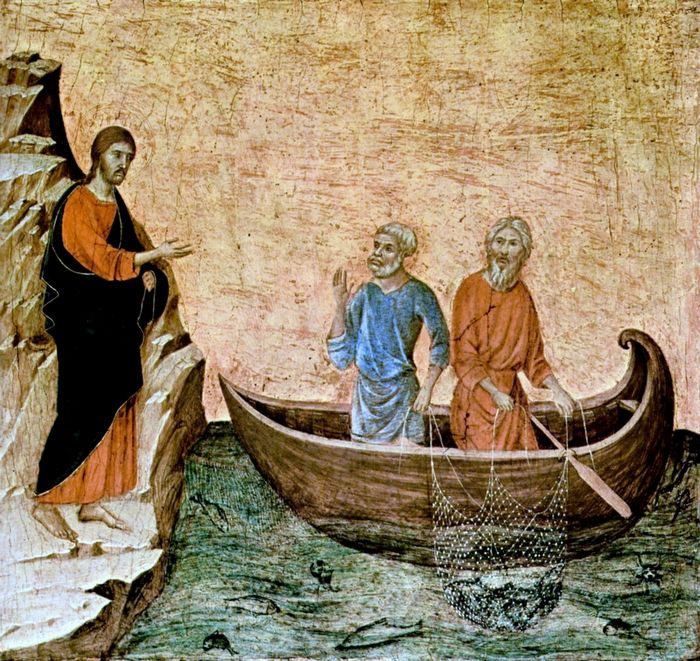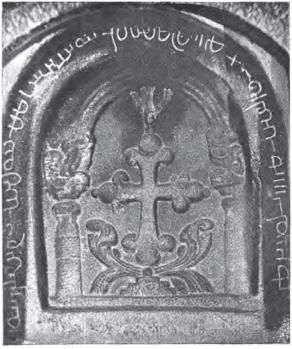 Poor Thomas. Having led a life of devotion, faith, and loyalty, his name today is virtually synonymous with doubt… Doubting Thomas. Not only that – but the only time his name comes up in the lectionary is on a week when almost every pastor is on vacation – the week after Easter. Poor Thomas!
Poor Thomas. Having led a life of devotion, faith, and loyalty, his name today is virtually synonymous with doubt… Doubting Thomas. Not only that – but the only time his name comes up in the lectionary is on a week when almost every pastor is on vacation – the week after Easter. Poor Thomas!
In many ways, we know too little about Thomas, and in other ways we know too much. I say that we know too much because we seem to add in some rather crucial details that are not in the text. Over the centuries, thousands of artists have illustrated the scene – and in virtually every one of those images, Thomas is depicted touching the wounds of Jesus. After all, he said that he would not believe that Jesus is risen unless he touched the scars on his hands and the wound on his side. But when John describes the scene, there is never any mention of touching. Jesus offers his body to be touched, but Thomas responds, not by touching, but by exclaiming “My Lord and My God.” The offer itself was enough. Thomas saw and believed.
In that sense, he is not actually any different from his fellow disciples. Jesus appears to them first, but Thomas wasn’t there. Apparently, he had to run an errand that evening. We don’t know what he was off doing. John doesn’t tell us.
It was Easter evening – the first Easter, so maybe Thomas was out gathering Easter eggs. Or maybe he was out grabbing some kosher Chinese takeout for everyone. We don’t know where he was. All we know is that the other disciples were hiding out, behind locked doors. Jesus appeared to them, showed his hands and side… he breathed on the them… he commissioned them, and then vanished again. Just like Thomas, they saw and they believed. When you think about it… they aren’t really any different from Thomas – but for some reason we isolate Thomas and say that he is the doubting one. Poor Thomas.
I know what some of you are thinking. Some of you are thinking – “No. Wait a minute. Thomas is different from the others. The other disciples told him that they saw JC, but he didn’t believe them. Well – look again… Just like Thomas, they had already heard the testimony of Mary Magdalene. She saw Jesus first. She spoke to him. After JC departed from her, she told the other disciples, but they didn’t believe her. Just like Thomas, they all doubted what Mary said. Just like Thomas… they heard but did not believe. Just like Thomas, they only believed when they saw Jesus.
Hearing Mary’s testimony should have been enough… but it wasn’t. They had to see for themselves. Hearing the disciple’s testimony should have been enough for Thomas… but it wasn’t. He had to see for himself.
Poor Thomas. He knew too little, so he didn’t believe. He knew too little because he did not know that he should believe his fellow disciples. If he had believed his neighbor’s testimony, then he would have believed without seeing. In fact, that’s what Jesus says to him: Blessed are those who have not seen, and yet come to believe. John then tells us that he has written these things so that we, who have not seen, might come to believe.
John’s point is clear: Even when we know too little… even when we don’t have enough information to decide what to believe, we should believe the testimony of our neighbor.
Poor Thomas, though. It is too late for him. He knows too much to have the kind of faith that comes from believing without seeing.
For those of you who don’t know me, you should know that I am entering my 12th consecutive year of full time graduate study in theology. No matter how you add it up, 12 is too many! When I met with my dissertation advisor last month, he actually told me, “Brad, you know too much.” Perhaps that comment needs a translation. What he meant was… Brad, you are filled with tons of useless information that make things far more complicated than they need to be. Believe me… that’s true. Over the years, I have come to know too much about dear Thomas, too. I know things that I just don’t know what to do with.
For starters, I know that his name is not Thomas. Our passage this morning reads, “Thomas, who was called the Twin.” Actually, the word “Thomas” is an Aramaic word that means “the twin.” So, the text actually says, “The twin who was called the twin.” That raises two questions… What was his name? … and… Whose twin is he? Well, what I am about to tell you is the kind of thing that we aren’t supposed to talk about in church. It is ok, though, because almost none of you are going to believe what I tell you – You are going to doubt my testimony, even though we all agreed a moment ago that the point of the story is that we should believe without seeing. ?
Thomas’s real name is actually Judas. No, he is not that Judas. John tells us explicitly that there are two disciples named Judas… one is Judas Iscariot, who betrays Jesus. Thomas the twin is the other Judas… you know… the Judas who is Jesus’ brother. Mark’s gospel (chapter 6, verse 3 if you doubt my testimony) tells us that Jesus had four brothers: James, Joseph, Judas, and Simon as well as some sisters who are, of course, un named. But what do we make of the fact that Jesus had a brother who is called the twin?
In the early centuries of the church, many Christians believed that Judas Thomas was Jesus’s twin brother. There are even ancient texts, including the Gospel of Thomas, which suggest that Thomas the twin was actually Jesus’ twin brother… See what I mean about knowing too much and knowing too little?
What do we do with that information? What does it mean? Should we believe it? Should we not believe it? What difference would it make, either way? Would it explain why Mary Magdelene, who was the first to see the risen Christ, didn’t recognize him? Well… may-be… Sort of.
When Mary saw the man by the tomb, she didn’t recognize him as Jesus – but she surely would have recognized Thomas. She wouldn’t have thought he was the gardener of the cemetery. But remember that John’s gospel makes no mention of a virgin birth. No mention of a divine child or childhood. For John, the story begins with Jesus’ baptism and it extends for exactly one year – from Passover to Passover.
As most New Testament scholars will tell you… from John’s perspective… Jesus was a fully human person who becomes the fully divine Christ at his baptism. Right at the very beginning of John’s Gospel, verse 12 of chapter 1, John tells us that whosoever believes in Christ can become a Son of God. So it doesn’t really matter at all to John if Jesus had a twin brother, a wife, a mortgage, or a bad credit rating. What matters to John is that WHEN Jesus was baptized… all of those things became a part of the past. He had a new life as the Son of God… and, more importantly, from John’s perspective, so can you.
So… when Mary saw the man at the tomb and thought that he was the gardener – he very well might have been the gardener. It wouldn’t make any difference to John. What matters is that this fellow was now the Word of God, the Son of God, the risen Christ. When Mary looked at him, she only saw his body… and thought he was the gardener. But when he spoke to her – when she heard his Word –– She recognized the Risen Christ.
So… back to this crazy twin brother idea. Regardless of whether or not it is true – what does it mean? If by twin brother we understand biological brothers, then it wouldn’t mean anything at all as far as John is concerned. But if we understand “twin brother” to mean that this fully human fellow named Thomas became a Son of God by incarnating the Word and Spirit of Christ, then it does matter. It matters because it means that you and I can also become Christ’s twins. We can leave behind our old selves and become Sons and Daughters of God by living out the Spirit of Christ. This, from John’s perspective, at least, is what Easter is all about. Christ is risen. Christ lives – but only insofar as you and I become like Christ. We – you and I – are called to be the Resurrection and the Life.
Let’s get back to poor Thomas… the man whose name has become synonymous with doubt. As you might recall from the scripture reading a few weeks ago, Jesus said to the disciples – hey… let’s go to Jerusalem. They all responded – what? Are you kidding? If you go to Jerusalem, they’ll kill you. It was Thomas – and John reminds us here again that his name means “twin” … it was Thomas who said to the other disciples, “Let’s go with him, so that we may die with him.” Thomas was no skeptic… He was a loyal and committed follower. He was determined to follow Jesus – like a twin – even to death.
So, when I said earlier that John wants us all to become Sons and Daughters of God, that he wants all of us to incarnate the Word of God and live in the Spirit of Christ – it is helpful to also remember that the Gospel of Christ according to John begins at Passover… when Jesus is baptized and becomes Christ –– and it ends at Passover… when Jesus is executed.
John’s story ends where it began – for those who believe in Christ and become Sons and Daughters of God — Easter is another way of saying… hey –– it’s your turn.
But how do we know what to do? If we are supposed to incarnate the Word and become Sons and Daughters of God, how does that translate into action and service? … We always know too little.
As a parent, I always know too little. I never act with enough knowledge. I am almost always more than a little unsure how to discipline my children and how to encourage them.
One thing that I can say for sure… with absolute confidence is this…One day, when my kids grow up… move out of the house, and are living on their own – they will need to start seeing a psychologist to try and correct all of the mistakes that I’ve made… I know that I am making mistakes as a parent. There is no doubt about that. The problem is – I don’t know what mistakes I am making!
We never know enough to act… We doubt ourselves and our actions. We step carefully, trying to keep our mistakes minor and insignificant, knowing all the while that we cannot avoid making them. Poor Thomas. The doors were locked. The disciples were NOT expecting company. How was he supposed to know… when he ran out to grab some dinner – or whatever he was off doing that Easter evening – that Christ was going to show up three days after he died.
Regardless of whether or not Thomas was Jesus’ twin… there is no doubting that Thomas was Jesus’ brother. Maybe Thomas wasn’t there that evening because he was with their mother. Maybe Mary needed consolation after witnessing her son’s terrible death. Or maybe Thomas just needed some space to try and deal with it all – an escape from the Friday that he did not know was supposed to be “Good.”
Thomas may not have been Jesus’ twin – there is actually plenty of evidence that he wasn’t… but in many ways, perhaps he is our twin. He knew too little. He didn’t know enough to act. He didn’t know how to react or what to believe. He didn’t know that he should have stayed in that locked room with the others. He didn’t know that he should have believed Mary and the other disciples. He just knew too little – just like we do.
On the other hand… Thomas knew enough. He knew that he should follow Jesus to Jerusalem even if it meant his death. He knew that he had been made an Apostle – one who is sent on a mission.
In these years of learning too much, I have managed to pick up another tidbit of information about Thomas. According to multiple traditions… Thomas became an Apostle sent to carry the Word of Christ to India. In the year 52 A.D., it is believed that St. Thomas landed on the shores of Kerala in southwest India and founded what became the Mar Thoma Church. Don’t take my word for it… there is actually a large Mar Thoma Church right next door in Maynard. They’ll tell you that Thomas spread the word of Christ across Southern India before he was finally martyred in Tamil Nadu. At the traditional site of his death in Madras, there is a church bearing a cross said to be chiseled by St. Thomas himself.
As you can see, there is an image of a dove descending – this represents the Holy Spirit, which descended upon Jesus at his baptism… Christening him – making him the Christ.
The dove also symbolizes the Spirit which descends upon us – making us spiritual twins of Christ. But notice especially that the cross depicted here rests upon a blooming lotus flower. Or, perhaps, the cross is emerging out of the lotus flower. Here in Massachusetts… we don’t see too many Lotus flowers.
It’s just not a part of our culture the way that it is in India, where poor Thomas spent his final days… In Southern India, though, you see lotus flowers all over the place. The lotus flower flourishes in still waters, where things are clam and peaceful. It absolutely loves murky, muddy pools.
Elizabeth and I lived in Bangalore, India, for two years. One thing about Bangalore is that it is growing far, far more quickly than its infrastructure… It is very common to see huge, high tech, state of the art buildings built by American tech companies like Intel or Cisco Systems – but these buildings will crop up in places that – quite literally – do not have roads built to them.
Ten years ago, the city of Bangalore had a population of about 6 million people – which was roughly 10 times the size of Boston. Today, it has a population of over 10 million people – nearly double. Suffice it to say that much of Bangalore does not have a high tech sewage system. What it does have is deep trenches alongside the road. I think you get the picture.
The thing about the lotus flower is that it has a waxy coating on it. Water, mud, and… well, other things… just roll right off of it. If you look in the deep trenches along the roadside in Bangalore, you will see them gloriously decorated with lotus flowers that are as colorful and vibrant as they are calm, majestic, and royal.
Each evening, their petals close around their bright yellow center. Each morning, they open and rise, stretching out of the muck to shine their colors towards the sun.There is an ancient Sanskrit verse about the bright yellow center of the Lotus, beginning “Om mani padme hum’… “O Jewel in the Lotus Flower… the divine is fully in you, just as you are fully in the divine.”
When we look at this image of the St. Thomas cross, emerging from the center of the lotus flower, we might recall that verse from earlier in John’s Gospel… “I am in the Father and the Father is in me.” When I act – as a father – I always act with too little information. I do my best. I love my children. Even on days when they drive me nuts… I love every little bit of them. When I look upon their faces… when I see them the way that Thomas saw Christ, and the way that Mary saw Christ – I remember that I am the gardener. It is my job – especially after Easter – to nurture them and guide them as they rise up, out of the muck, to turn their vibrant colors towards the sun.
I think to myself… and sometimes – not often enough – I say to them… Om mani padme hum… O jewel in the lotus flower… the divine is fully in you and you are fully in the divine.
Like the petals of the lotus flower, we are sheltered each night from the darkness, and we open each morning to face the sun (s-U-n) or perhaps to face the Son (s-O-n).
We face each and every day knowing far too little. We never have enough information to act… especially if we know too much about this world and its muck. But we are called each morning to open our petals… to let everything roll off of our backs, like the muddy waters roll off of the lotus flower… and to turn our vibrant colors towards the sun.
Sometimes we know too little… sometimes we know too much… but if we know that God is in us and we are in God… then we know enough. Thanks be to God.
~Brad
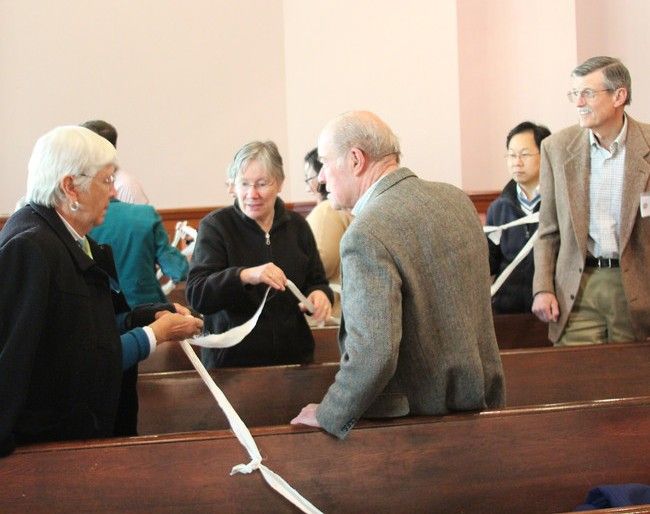
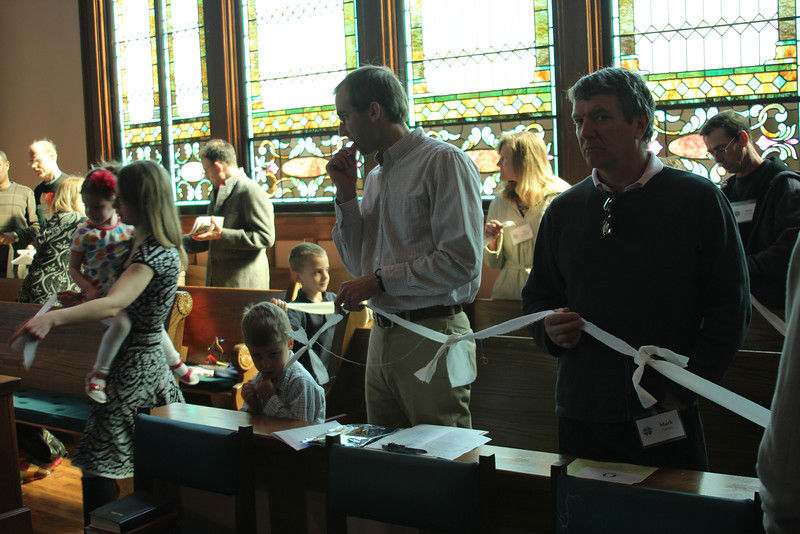
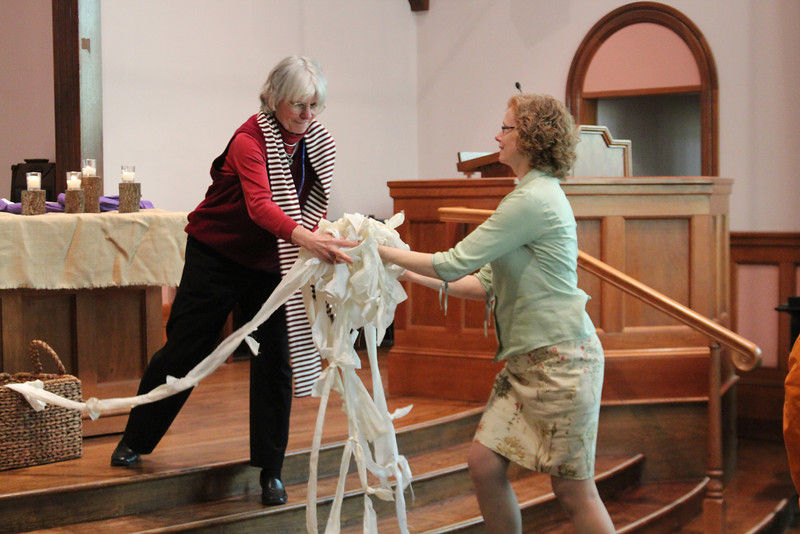 turning death into life.
turning death into life.